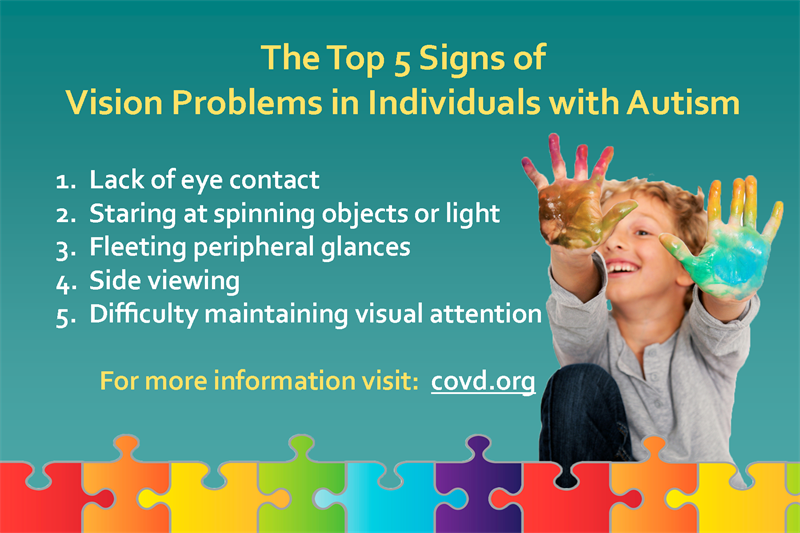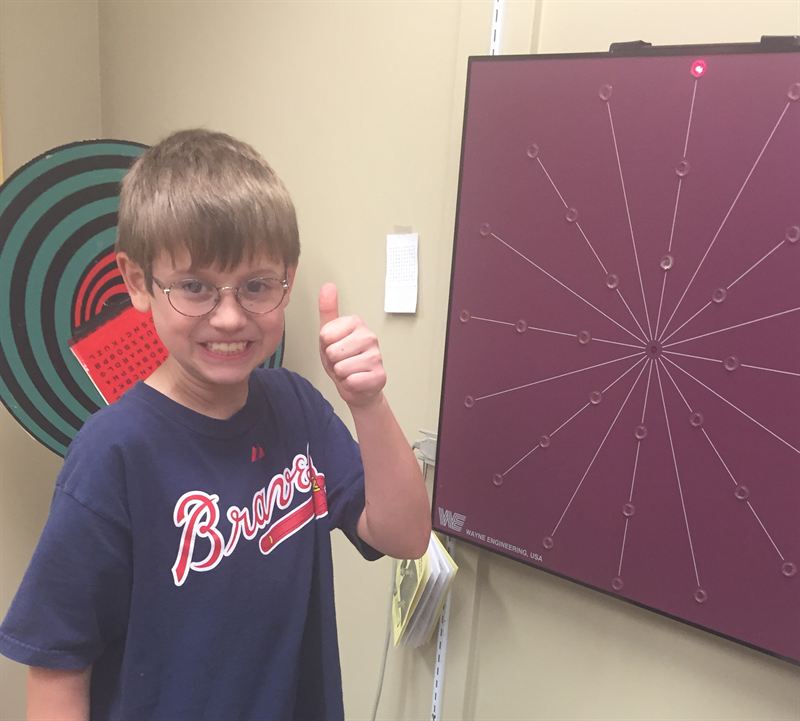Helping Children with Autism Focus on the World Around Them – COVD Supports Autism Awareness Month
For parents of children with Autism, it is a never ending quest to sort through all the different therapies that are available to help improve quality of life for those on the spectrum. For Autism Awareness Month, the College of Optometrists in Vision Development (COVD) is bringing awareness to the availability of optometric vision therapy and how it can positively impact those on the spectrum.
“I was always told my son, Cass (who was diagnosed with high functioning Autism in January 2014 when he was 9 years old) could see 20/20, so I didn’t even think that his vision could be contributing to his reading problems,” Penelope Massagee of Charleston, SC, shares; “You can imagine my surprise when I found out he was seeing double and that words looked like they were moving on the page. He must have thought it was normal, because he never complained!”
It is a common misconception that 20/20 means one has perfect vision. The term 20/20 was actually developed in the 1800’s and only means one can see a certain size of letter from 20 feet. There are a variety of other visual skills required for academic success and functioning in life including eye coordination and eye tracking problems
“Many inadvertently overlook eye coordination and eye tracking problems which can cause the types of problems Cass was having when he tried to read. Vision problems can often accompany autism spectrum disorders and other developmental delays,” states Dr. Ida Chung, OD, FCOVD, president of the College of Optometrists in Vision Development.

Today, Cass is halfway through a program of optometric vision therapy. The double vision is gone and words no longer move on the page. In addition, his mother shares, “I tell everyone about Vision Therapy. Even if their child doesn’t have autism, if their child is struggling with school, I tell them that the most important thing is to get their child’s vision tested. Even when someone tells me their child has ADD and trouble focusing, I encourage them to get an eye examination by a developmental optometrist. If my sister had not told me about vision therapy, Cass would still be struggling. So I want to help other parents.”

Autism expert, Ricki G. Robinson, MD, MPH, is a Clinical Professor of Pediatrics at Keck School of Medicine and the Co-Director of the Descanso Medical Center for Development and Learning in La Canada, California which is a practice devoted to children and families affected by Autism Spectrum Disorders. In her book, Autism Solutions: How to Create a Healthy and Meaningful Life for Your Child, Dr. Robinson states, “Precise coordinated eye movements are needed for focusing, eye tracking and binocular vision (eyes working together). All are required for maintaining eye contact and spatial awareness, even hand-eye coordination. All are potential concerns for children with ASD. However, if these skills are delayed, they can be learned.”
For many children on the Autism Spectrum a program of optometric vision therapy can help them learn the necessary visual skills for reading and functioning in life. Just as neuro-typical children can struggle with reading because of underlying eye coordination, eye movement and eye tracking disorders, so do children on the spectrum. Some of the more common signs that a vision problem is present includes: Avoidance of near tasks such as reading, skips lines or loses place when reading, poor eye contact and difficulty tracking moving objects.
“We would like to encourage you to learn more about the types of vision problems that can add to a child’s challenges with ASD,” states Chung, “When individuals with ASD have vision problems they will often show certain behaviors that can easily be assumed to be part of being on the spectrum. However, these vision problems are often very treatable. This is why it is so important to have these children examined by a developmental optometrist.”

During the month of April people will be posting information about vision and autism on COVD’s Facebook page. Please also visit COVD’s website, specifically the page on Autism and Vision.
We invite and encourage everyone to join our efforts and share information by using the hash tags #autism, #asd, and #visiontherapy and to read all the posts related to vision therapy or autism to learn more.
CONTACT: Pamela R. Happ, MSM, CAE
COVD Executive Director
330.995.0718 tel
Email: phapp@covd.org
Website: www.covd.org
About COVD
The College of Optometrists in Vision Development (COVD) is an international, non-profit optometric membership organization that provides education, evaluation, and board certification programs in behavioral and developmental vision care, vision therapy, and visual rehabilitation. The organization is comprised of doctors of optometry, vision therapists and other vision specialists. For more information on learning-related vision problems, vision therapy and COVD, please visit http://www.covd.org/ or call 330.995.0718.
A series of public service announcements (PSAs) are available at covd.org to help raise awareness that vision problems can not only interfere with learning, but sports performance, and other activities of daily living. These PSAs also address vision problems that impact individuals who have autism spectrum disorders or those who have suffered a head injury.
Tags:



